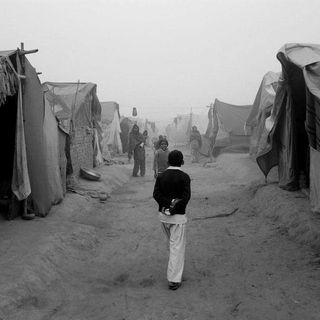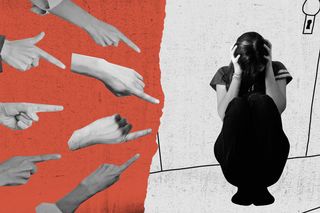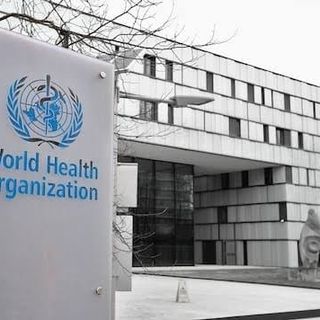
Domestic Violence Victims Need More Than Hotline Numbers During Lockdown
The government needs to provide practical solutions that take restrictions on movement, access into account, say experts.

“I’d rather die from coronavirus than from my husband’s beatings,” says L.P., a 34-year-old woman who works as a house help in Mumbai. Her husband’s abuse is not new for her, but what has changed is that she no longer has means to escape it during the lockdown. “I’m always at home with no work to go to and with no alcohol to distract him; the intensity of the abuse has only become worse,” she adds. Although she sought help from the NGO she has been in touch with, she is under constant monitoring by her husband, and there’s little they can do over the phone.
According to India’s 2015–2016 National Family Health Survey (NFHS), one-third of the women in the country experience domestic violence. Now, being confined at home with their abuser has made survivors like L.P. even more vulnerable. And this “invisible crisis,” as experts are calling it, will only get worse. Studies show that emotionally stressful events, like the 2008 economic crisis and during natural disasters, cause a surge in aggressive behavior at home.
One such spike in domestic violence occurred on April 10, 17 days after the nationwide lockdown was announced. Subsequently, the National Commission for Women (NCW), the government’s statutory body concerned with policy matters affecting women, started a Whatsapp hotline for survivors. The NCW also said complaints could be e-mailed or registered on their website.
Since then, various states have launched hotline numbers for survivors. But these measures are proving to be grossly insufficient for a variety of reasons.
Women don’t have access to phones
In India, only one-third of women have access to the internet and just 43% of women — as compared to 80% of men — have a mobile or telephone. “Imagine the condition of women living in villages and who don’t have access to mobile or e-mail since they cannot even send a letter to the commission’s address because of the curfew,” said Manisha Gulati, chairperson of the Punjab State Women Commission to Times of India. Earlier, the NCW used to receive complaints via its fixed helpline numbers and through the post, which have been shut since the lockdown came into effect.
“I don’t know how to send e-mails, and since my husband has not given me a smartphone, I can’t use his to send a Whatsapp message either. I haven’t tried calling the police yet because I’m worried that if he gets to know, he’ll beat me up even more, or my in-laws will harass my parents for dowry,” says L.P.
This lack of access is evidenced by reports stating there has been a drop in the number of calls to NGOs since the lockdown. “A lot of Indian homes have one phone and most often that does not belong to a woman,” explains Swarna Rajagopalan, a political scientist and the founder and director of Prajnya Trust to News18. “With abusive families at home and limited services available, the silence of the already silent victims is only getting louder.”
Related on The Swaddle:
A Domestic Abuse Pandemic Is Ensuing Under Covid19 Lockdown
Police intervention has been inadequate
The NCW also urged women to reach out to their nearest police stations, but experts say this, too, is of little help, as the police machinery is overburdened and strained. “They’ve been forced to redirect their resources in ensuring discipline under the lockdown,” says Nandita Shah, co-director of Akshara, a Mumbai-based NGO. This makes cases of domestic violence low on their priority list.
Take Kolkata-based K.M.’s case, for instance. K.M. called the police to report abuse at the hands of her in-laws but didn’t receive any help until she reached out to a government-employee relative. “Her in-laws didn’t give her food to eat for days; she would eat leftovers from her toddler’s meals,” recounts her niece. “When I tried to call the police, nothing happened. It was only after my father intervened that we could send my aunt back to her mother’s house from her in-laws’ amid the lockdown,” she added.
A victim could earlier be brought to the safety of a shelter home, according to Siddharth Chandrashekhar, a practicing advocate at the Bombay High Court. But now, with videos of police beating up people on the streets, no woman wants to step out. “They will think it is better to get beaten up by a known man than to get beaten by a bunch of policemen,” said Jayashree Velankar, director of Jagori, a women’s resource centre to News18.
Women’s movement has been restricted during lockdown
About shelter homes, Shah says, “First, we anyway don’t have that many. Second, with shifting [women] in existing ones, the concern is they’ll get overcrowded, raising the risk of the virus spreading.” Given such a scenario, even families discourage survivors from reaching out to complain.
Shah claims that a lot is being done at the state level to ensure that complaints of domestic violence are taken seriously. “In Maharashtra, survivors can dial 100, which is a police number. The police has tied up with many NGOs, special cell response teams with the help of which, they redirect the survivors and ensure they get help.” However, the problem arises in actually sending help. “Movement has been a problem even though all services related to domestic violence have been recognized as essential services and have been issued passes. But some localities in the red zone or orange zones are difficult to get access to,” Shah says.
“In the attempt to flatten the COVID19 curve, women’s equality and physical and mental health seems to have suffered a collateral damage,” state authors of a paper titled Addressing domestic violence: A forgotten agenda while locking India down for Observer Research Foundation, an independent think-tank. “The government overlooked the need to formally integrate domestic violence and mental health repercussions into the public health preparedness and emergency response plans against coronavirus,” the authors add.
How the government could help
Governments in other countries provide examples of concrete steps that can be take to accommodate survivors in these times. In Italy, the government launched an app that allows survivors to seek help without needing to make a phone call. The French government opened up pop-up counselling centres while also paying to relocate survivors of domestic violence to hotel rooms. It also urged survivors to walk into drugstores and ask for “mask-91,” a code word that signals to the sellers to contact the police. Both Shah and advocate Chandrashekhar reported that India didn’t have any such measures in place for its survivors.
A similar system could be set up here, as pharmacies and grocery stores have been categorized as essential, and are meant to remain open in each area. “Local authorities should assure informers that their identity will not be disclosed,” writes Nalini Gulati, managing editor for Ideas for India, an economics and policy portal.
Canada has decided to keep domestic violence shelters open and also diverted $50 million to support these facilities. Gulati adds that the government could have designated safe spaces for survivors while it was looking for accommodation spaces, such as hotel rooms and stadiums, to set up quarantine wards for Covid19 patients.
“Like in the case of migrants and the poorer sections of the society, the government has shown no concern for women or domestic violence while planning and announcing the lockdown,” says Chandrashekhar. “There have been funds created amid the pandemic to help with everything and everyone but survivors of domestic abuse.”
These measures do require resources, but so far, only 35% of the ‘Nirbhaya Fund’ has been spent across ministries since it was set up in 2013. Although the fund was set up to make public spaces safer for women, in the present situation, it could be used to help survivors of domestic abuse, Gulati says.
It is also important to continue and improve messaging around domestic violence. “The NCW could increase its advertising expenditure on TV to relay messages requesting women to contact the police station for help. The 181 helpline number set up, for this reason, should remain active, and women should be reminded of this number via TV ads. The government could also send mass SMS messages as it did during the onset of the COVID-19 crisis,” write Akshaya Vijaylakshmi and Pritha Dev, faculty at IIM-Ahmedabad for The Hindu.
In the absence of long-term responses, Mumbai-based psychologist Dr. Shweta Wagle warns this is just the beginning. “As the fear of uncertainty looms over, and abusers feel a lack of control over their lives, it’s going to get worse for survivors.”
Anubhuti Matta is an associate editor with The Swaddle. When not at work, she's busy pursuing kathak, reading books on and by women in the Middle East or making dresses out of Indian prints.
Related


WHO Says Coronavirus Did Not Come from Chinese Lab, Calls Trump’s Claims ‘Speculative’
